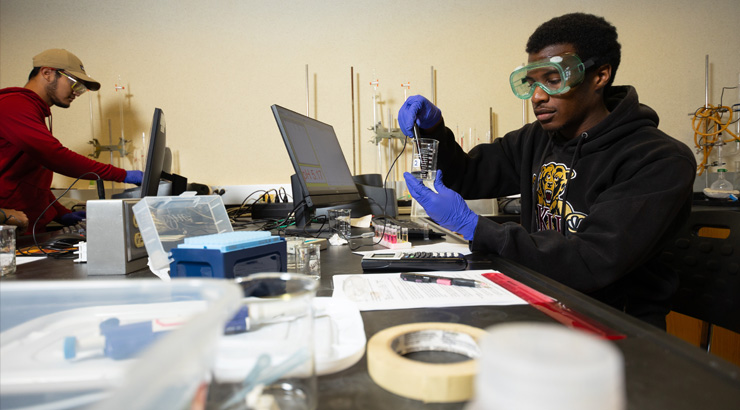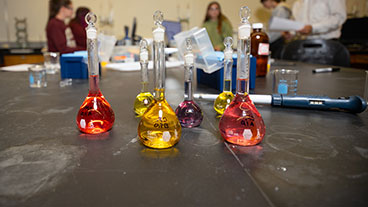
Chemistry-Biochemistry Program
Chemistry Degree
master the tools chemists use to explore and transform matter.
Quick Look
OFFERED AS:
Major, Minor
FORMAT:
In-Person
CREDITS REQUIRED:
Major (120), Minor (23-24)
Make a difference in the world as a chemist with a B.S. in chemistry from Kutztown University. Our major in chemistry is one of the most affordable and valuable physical science degrees in Pennsylvania.
As a chemistry student, you are guaranteed hands-on experience allowing you to master modern chemical instrumentation. The following instrumentation is the kind of experience future employers are looking for:
- Spectroscopy
- Chromatography
- Electrochemistry
- Molecular Modeling
Hands-on. Career-driven. Research-focused.
Why Choose KU for a Chemistry Degree
KU’s chemistry degree is centered around equipping you with industry experience and core techniques used in real laboratories. By graduation, you will have the skills and confidence needed to launch a rewarding career as a chemist.
Top reasons to choose KU:
- Immediate lab experience led by caring professors
- Study and live on a charming campus in Pennsylvania
- A degree approved by the American Chemical Society
- An affordable education with financial aid opportunities

Welcome to one of the many lab spaces you get to work in as a chemistry major at Kutztown University!
What you will learn with your Chemistry Degree
When you major in chemistry at Kutztown University, you are on the brink of becoming an expert in critical thinking in the most organic way. Here is what makes KU’s major in chemistry one of the most hands-on programs in Pennsylvania.
Program Highlights:
- Access state-of-the-art teaching and research laboratories
- Utilize modern chemical instruments such as spectroscopy, chromatography, molecular modeling software
- Assist faculty with scientific research as an undergraduate
- Work closely with professors in student focused, upper-level classes
- Complete internships and undergraduate research for credit
- Join the Student Affiliates of the American Chemical Society at KU
Student Learning Outcomes






